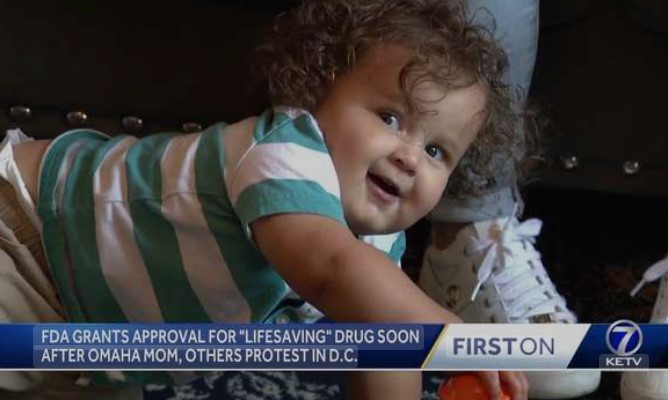FDA approves ‘lifesaving’ drug after Omaha mom’s pleas; ultra-rare condition gets first FDA-approved treatment

By Aaron Hegarty
Click here for updates on this story
OMAHA, Nebraska (KETV) — An Omaha mom is celebrating the Food and Drug Administration’s approval of elamipretide for Barth syndrome.
The sign Jordan Karle held outside the White House in late August makes the alternative clear: “We implore the FDA to rescue our babies from certain death.”
Karle’s 1-year-old son Jaylin has Barth syndrome, a condition only 150 people in the U.S. are estimated to have.
At birth, Jaylin’s heart was failing, Karle said. But after beginning elamipretide, Jaylin left the hospital after a month, she said.
Jaylin has had a nightly injection of elamipretide since then, Karle said, but the manufacturer, Stealth BioTherapeutics, would not have been able to support creation for much longer without any FDA approval.
Elamipretide, which has a brand name of Forzinity, was granted accelerated approval on Sept. 19.
Karle and other advocates traveled to Washington, D.C., in August after a second FDA denial this year. While they were there, they landed a meeting with FDA Commissioner Marty Makary, Karle said.
Annie Kennedy, the director of policy and advocacy at the EveryLife Foundation for Rare Diseases, says their advocacy and data marked the reasons why the drug ultimately received approval.
Kennedy said approval was complicated by the fact that clinical trial data were for those 12 and older, though infants who see the onset of the condition in early life are the most adversely affected.
Karle said her advocacy is not done because the approval is only for those 66 pounds and above.
She said one in 10 Americans has a rare disease, and not many have an FDA-approved treatment.
“Disease communities tend to work together,” she said. She said they’re collectively advocating for funding for research for those diseases now. That’s something we’re all depending on right now, is to make sure that our federal agencies, our public health systems remain funded.”
The executive director of the Barth Syndrome Foundation, Emily Milligan, told KETV in a statement that she hopes the FDA’s turnaround marks the beginning of a new chapter for rare disease communities.
“We will continue to encourage the FDA to exercise this logic in the post-approval space regarding confirmatory evidence,” she told KETV. “The FDA’s bar must be achievable and realistic for such small populations like the Barth syndrome community to retain access and preserve children’s rights to life-saving medications.”
Please note: This content carries a strict local market embargo. If you share the same market as the contributor of this article, you may not use it on any platform.